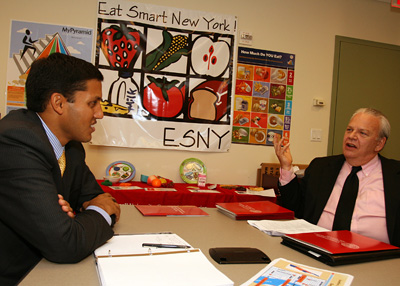Undersecretary of agriculture turns to Cornell as a model of urban extension
By Liz Borod Wright

When Rajiv Shah, the new undersecretary of the U.S. Department of Agriculture (USDA), wanted to see how scientific research helps serve the public in urban environs, he turned to Cornell University Cooperative Extension in New York City (CUCE-NYC).
"We are in the process of reimagining what the science agencies can do to help advance the president's priorities," Shah said. The USDA is planning to launch the National Institute of Food and Agriculture, which will address the issues of food safety, nutrition and obesity and will be modeled after the National Institutes of Health (NIH).
Shah met with Donald Tobias, CUCE-NYC's executive director, Julian Imperato-McGinley, associate dean of translational research and education at Weill Cornell Medical College, and several CUCE-NYC staff members Sept. 25 at the CUCE-NYC offices on E. 34th St. in Manhattan to learn about Cornell's programs serving the metropolitan area.
He also toured the Food and Finance High School, a public high school in midtown Manhattan where Cornell has instituted the Hydroponics Learning Model in which students raise edible fish and plants in tanks. He ate lunch there as well, which was prepared by the culinary arts students.
CUCE-NYC's nutrition and health education programs seemed to interest Shah the most, according to Tobias. "He was very interested in the size [of the programs] and the methods we were using in nutrition education," Tobias said. "He seemed to be particularly interested in what we were doing in the schools and the Kitchens of Faith community."
Eighteen churches in New York City have become Kitchens of Faith by completing an eight-session training program emphasizing nutrition; they also participate in regular videoconference sessions in which health care professionals answer their questions.
Shah also appeared to be keen to know more about the Urban 4-H programs that CUCE-NYC runs, as he said that he thought 4-H is "usually associated with raising livestock." The Urban 4-H tends to attract older youths and has a focus on the community, Tobias explained. The teens create public service announcements, devise a curriculum on human sexuality and practice public speaking.
"A number of times throughout the day," Tobias said, "[Shah] talked about how the Washington perception of cooperative extension is of a rural orientation. Shah left New York City enthusiastic about telling the story of urban extension."
Another area that intrigued Shah, noted Tobias, was the partnership between CUCE-NYC and the medical college through the Clinical and Translational Science Center (CTSC), a consortium that includes Memorial Sloan-Kettering Cancer Center and Hunter College School of Nursing. CTSC links research, clinical practice and community to rapidly improve the health status of New Yorkers. While this partnership is unique, it is one that could be replicated among other institutions, Tobias added.
"[Shah] is interested in publicizing this model to land-grant universities across the country," Tobias said.
Liz Borod Wright '99 is a freelance writer in New York City.
Media Contact
Sabina Lee
Get Cornell news delivered right to your inbox.
Subscribe